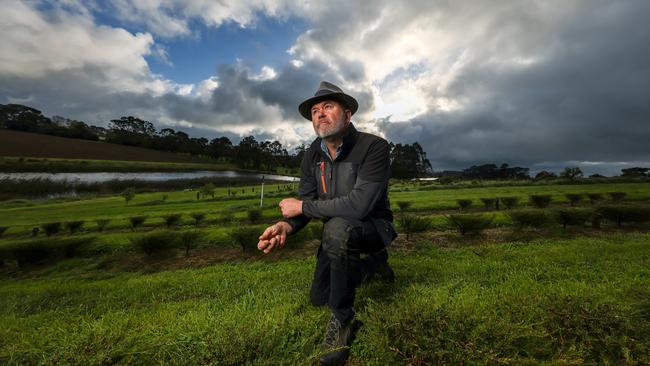Parkinson’s genetic trial targets ‘unknown unknowns’ of treatment and testing
Australian scientists looking to bring genomic testing into Parkinson’s research have reached a potential breakthrough in both treatment and understanding.

Stephen Reynolds, fresh from his latest harvest, says he is busier than he has ever been. At 52, working long hours farming boronias in rural Victoria, he’s far from your typical Parkinson’s patient.
“I play a bit of piano and a bit of guitar,” Mr Reynolds said. “I remember playing the piano one time, and on the sustain pedal my foot was just bouncing around a bit too much. I didn’t think too much of it, but then I noticed it getting worse.”
Diagnosed in 2017 with early onset Parkinson’s, Mr Reynolds has found a new reason to hope he can keep working into the future through his participation in a research project.
A Parkinson’s trial based on specialising research to the genetics of patients has pushed the first potential treatments that can abate the condition’s progression, while using available medicines.
On Thursday, the Australian Parkinson’s Mission announced its second trial, which uses genomic testing and two drugs in combination to both assess the efficacy of the potential treatments and learn more about how the genetics of an individual affect how Parkinson’s can be diagnosed, understood and treated.
Researchers collaborating across the Garvan Institute of Medical Research, Macquarie University and the University of Sydney, bankrolled by the Medical Research Future Fund, are hoping the study’s 240 participants could provide them the means to map Parkinson’s various subtypes, finding “biomarkers” in a patient’s DNA that could be used to match them to specialised treatments.
This precision medicine approach could slow disease progressions, where previously all treatments were used to abate symptoms: 150,000 Australians are affected by Parkinson’s, a figure that is tipped to rise.
The two medications under trial are an antibiotic and a respiratory decongestant, each believed to have applications in slowing Parkinson’s. “To be honest, Parkinson’s is more annoying than tragic,” Mr Reynolds said. “It robs you of energy, there’s a fatigue factor that can set in.
“But I’m always hopeful. There are two ways of handling a disease like this – either you get on with it and make the best of it, or you wallow. I don’t wallow.”
Research director of the Australian Parkinson’s Mission Antony Cooper said the puzzle of Parkinson’s causes and the unmet need for better treatments necessitated a more wide-ranging study. “We’re kind of like cancer 30 years ago. People have the disease but we don’t know, for the vast majority, what’s causing it.
“If you don’t know what’s causing it, you can’t develop treatments and drugs to target that.”
He said the study’s genomic component could also be used to learn more about past Parkinson’s trials deemed a failure. By determining the genetic profiles of past participants, the manner in which the trial affected their particular subtype of Parkinson’s could be analysed.
“I believe there are several different mechanisms that can result in Parkinson’s and therefore that might account for why our past clinical trials have failed,” Associate Professor Cooper said. “Until now, we have assumed most patients have the same mechanism, and they probably don’t.”
Clinical lead Simon Lewis referred to it as a “smart trial”. “It’s Don Rumsfeld’s unknown unknowns. We don’t know what we don’t know,” he said “We’d like to do a smart trial where we don’t necessarily look at the end pathology, we look at pathways and try to find drugs to target them.”






To join the conversation, please log in. Don't have an account? Register
Join the conversation, you are commenting as Logout